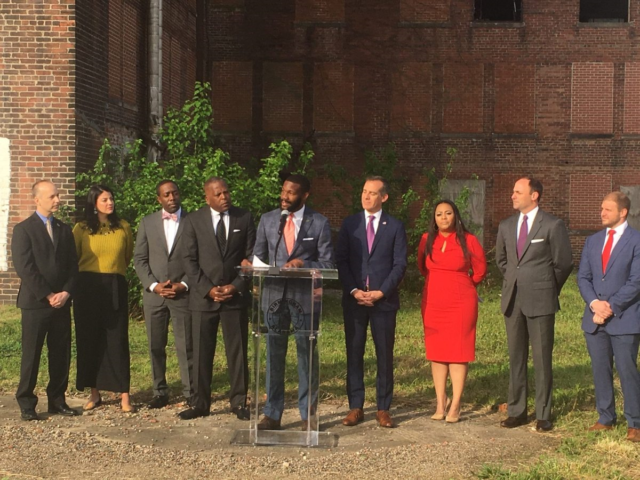
birminghamal.gov
Mayor Randall Woodfin on Friday unveiled the Birmingham Inclusive Growth (BIG) Partnership, a private sector-led, community-focused, city-inspired Opportunity Zone initiative to elevate quality of life for residents and produce returns for investors.
The announcement was made at the historic Stonewall/American Life building, 2308 Fourth Ave. North, which has been vacant for 36 years. A private investor will renovate the building into 140 workforce housing units. Work on the building is to begin within 45 days. Construction is slated to be complete 14 months after that. The average rent for an apartment will be about $900, said Ed Ticheli, the building’s owner.
“When I bought this building, people said, ‘No one is going to live there. They said, ‘You are crazy,’” said Ticheli, standing outside the 12-story building, which will have an adjacent parking lot. “But look at where we are today.’’
“I believe in this building.’’
The project was made possible through several efforts, including securing Alabama Historical Tax Credits and city infrastructure improvements. Five of the units will be reserved for a partnership with the Dannon Project and under- and unemployed residents it serves.
The Opportunity Zone program provides tax advantages for investments in “opportunity zones,” which are census tracts that were nominated by the governor of each state and certified by the U.S. Department of the Treasury.
The BIG Partnership is an innovative structure that will drive investment into Birmingham’s 24 Opportunity Zones, designated by Alabama Gov. Kay Ivey and certified by the U.S. Department of the Treasury.
“Opportunity Zones have the power to be a transformational tool for neighborhood revitalization,’’ Woodfin said. “Through the BIG Partnership, we will be able to identify local projects that enhance the quality of life of our residents. We will also be able to market to national investors, who would have never known about the opportunities in Birmingham.’’
The city’s primary role in the BIG Partnership is to serve as a facilitator between the private, philanthropic, academic and civic sectors as well as neighborhood leadership to take action for inclusive and sustainable community development. Led by the city’s Department of Innovation and Economic Opportunity, the city and its private sector partners will work with civic leaders to discover and develop community and economic development projects that could be supported through Opportunity Zone Funding.
“Opportunity Zones touch 77 of our 99 neighborhoods, and our opportunity zone strategy will not work unless the voices of those neighborhoods are at the table,’’ Woodfin said. “Sometimes, complex policies developed in the halls of Washington D.C. can seem remote to the residents they are affecting. As a local government, we have the power and the obligation to bridge that gap. We want our residents to be empowered to identify projects and drive development in the places they know best.’’
“Open For Business”
Josh Carpenter, director of the city’s Innovation and Economic Opportunity, added: “The BIG Partnership is another way that Birmingham is telling the nation that we are open for business.
“The BIG Partnership could become a model public-private endeavor that harnesses the investment expertise of our investment committee, the convening power and resources of the city and neighborhood-level expertise to drive inclusive growth in our community.”
The Community Investment Board (CIB), a board comprised of 11 civic leaders from all nine council districts, will identify projects that align with their community’s needs and priorities to bring residents’ voices to the table as Opportunity Zone projects unfold.
The City of Birmingham, in partnership with the CIB and Opportunity Alabama, also announced an educational campaign to empower residents to participate in the BIG Partnership. By June 1, 2020, the BIG team, Opportunity Alabama, and the city will train 500 residents on the fundamentals of Opportunity Zones.
The linchpin of the partnership is the Investment Board (IB) and the Public Benefit Corporation (PBC) that they will oversee. The PBC is privately managed and autonomous. Its goal is to facilitate sponsorship of transformational Opportunity Zone projects that enhance the standard of life of Birmingham’s residents. The Investment Board is comprised of world-class business leaders who are also deeply invested in Birmingham’s growth and renewal to manage.
The website for the BIG Partnership may be found at www.birminghamoz.org.
Built in 1925, the Stonewall Building initially housed the Birmingham City Commission after a 1925 fire at Birmingham City Hall forced the commission to move from City Hall that year. In 1947, the FBI Birmingham division moved into the building. In 1962, it became the headquarters for the American Life Insurance Co. It later became home to the Stonewall Insurance Co. The building’s owner declared bankruptcy in 1983, and it has been vacant since. It is located at 2308 Fourth Ave. North.




